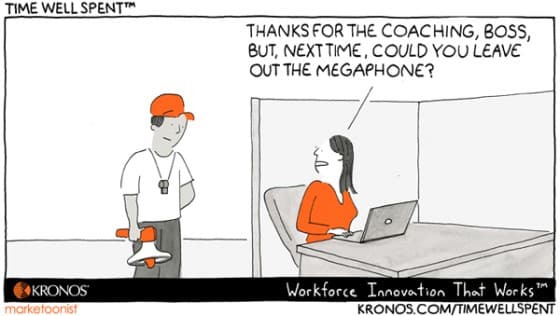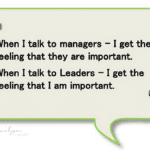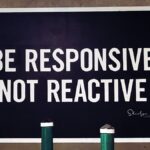(Editor’s Note: Today’s post is brought to you by our friends at Kronos, a leading provider of workforce management and human capital management cloud solutions. They’ve announced availability of “Your Last Differentiator: Human Capital”, authored by Gregg Gordon, vice president of the data science practice group at Kronos. You can download the first chapter here. Enjoy the post!)
We’ve talked a lot on this blog about the need for performance coaching. Not just coaching an employee when something goes wrong, but regular performance coaching so employees feel supported and do their very best.
One of the things we have to remember about coaching is that it doesn’t have to be shouted or visible to be effective. Today’s Time Well Spent from our friends at Kronos is a good reminder that visible doesn’t always translate into effective.
Sometimes the best employee coaching activities are the interactions that don’t look like coaching at all. Here are a couple of examples:
One-on-one conversations. I’m not necessarily talking about regularly scheduled one-on-one meetings, although those are great moments for coaching. I’m talking about the conversations we have in the car on road trips. Or in the airport waiting for a flight. Or over coffee at a conference. Managers and employees interact regularly outside of the 1:1 meeting. Employee coaching can happen then just as well.
Department meetings. I know that I just mentioned 1:1 meetings. But who said all coaching must be done on an individual basis? Team debriefs are a great time to coach. Not only between managers and employees, but peer-to-peer coaching. Remember all employee coaching isn’t constructive criticism. There are times when coaching in a group format is good for the individual and the team.
Right now, managers are being given the directive, “Coach Your Employees!!” They need to embrace the concept. But on some level, we have to step out of the way and let them coach. Just because they’re not shouting it from a megaphone doesn’t mean it’s not happening. Ultimately, managers need to be held accountable for results. Because managers who successfully coach their employees will see higher engagement, better productivity, and increased retention. And those are the things we want to be shouting about.
1







